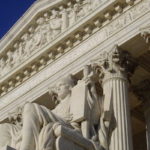Published February 17, 2014
Last month, just 12 days after taking office as Virginia’s attorney general, Mark Herring abandoned his state’s defense of its marriage laws in a federal lawsuit brought by same-sex couples. Switching sides to join forces with the same-sex couples, Herring explained that he had concluded that the state constitutional provision and statute “denying the right to marry to same-sex couples” violate the federal Constitution. Further, he wants Virginia to be “on the right side of history.”
Herring is not the first state AG to refuse to defend his state’s marriage laws. Jerry Brown bailed out on California’s Proposition 8 (the 2008 measure that amended the state constitution to override a state supreme court decision that invalidated the state’s marriage laws). After Brown became governor in 2011, Kamala Harris, his successor as attorney general, followed suit. And last summer, in the wake of the Supreme Court’s decision invalidating the federal Defense of Marriage Act, Pennsylvania’s Kathleen Kane declined to defend a lawsuit against her state’s marriage laws.
What Herring shares with Brown, Harris, and Kane is an elementary confusion about the duty of a state attorney general.
Under well-settled principles of the American adversary system, a lawyer is ethically obligated to represent his client’s legal position zealously in court. That means, among other things, that if there are nonfrivolous arguments that can be advanced in support of a client’s position, the lawyer should advocate that position when the lawyer determines that it is in the client’s strategic interest to do so. Under narrow circumstances, a lawyer may withdraw from representing a client in a matter. But he may never fail to advocate a defensible position simply because he personally believes it to be legally incorrect.
By virtue of his office, a state attorney general is the top lawyer for his client, the state. Except for laws still on the books that are clearly invalid under existing judicial rulings, the only sensible legal position to impute to the state is that its laws—the provisions of the state constitution and the statutes consistent with those provisions—are valid and enforceable. The attorney general’s obligations as a lawyer therefore require him to vigorously defend any of those laws against challenge under federal law so long as there are reasonable (i.e., nonfrivolous) grounds for doing so.
From the beginning of our nation’s history until the last decade or so, the laws of all states understood marriage as the union of a man and a woman. Notwithstanding some ominous language in the Supreme Court’s anti-DOMA decision, the question whether such laws violate the federal Constitution—or, rather, whether a Court majority will say that they do—is unsettled. And whether or not you find them persuasive (as I do), it is indisputable that there are reasonable arguments that an attorney charged with defending these laws can responsibly make.
Herring and company don’t argue otherwise. Indeed, Herring acknowledges that a defense of Virginia’s marriage laws can be “responsibly and vigorously briefed and argued.” He instead posits that his own personal legal conclusions—or, in Kane’s telling emotive term, what she “feel[s]” about the federal Constitution—trump state law. But when he indulges his own personal legal views to conclude that defensible provisions of state law violate the federal Constitution, he is setting himself against his client.
It is no answer to maintain, as Herring does, that there are other governmental parties—two local court clerks—who will defend Virginia’s marriage laws. It is Herring’s job to do so, and it is his office that has the resources and the expertise. If Herring is unwilling to carry out his responsibilities, he should step aside (or resign) and let a subordinate take the lead. His failure to carry out his responsibilities is likely to damage defense of the state laws. That, of course, is why the plaintiffs and their allies are so ecstatic about his decision.
By a somewhat different path, it’s well settled that, except for laws that intrude on executive-branch prerogatives, the U.S. Department of Justice should vigorously defend the constitutionality of any law for which a reasonable defense may be made under existing precedents. Like the state attorneys general, the Obama administration acted irresponsibly when it instead decided in 2011 to formally abandon its defense of DOMA.
Let’s not forget that when the House of Representatives stepped in to defend DOMA and announced that it had hired former solicitor general Paul Clement of the King & Spalding law firm as its counsel, King & Spalding suddenly caved to pressure from gay-advocacy groups and, in clear violation of its ethical obligations, abandoned the representation.
It’s no coincidence, of course, that these derelictions of duty are occurring in cases challenging marriage. When advocates of redefining marriage to include same-sex couples pursue change through the democratic processes, they have incentives to persuade their fellow citizens. But when they resort to the courts to invalidate marriage laws, they perceive that victory may well hinge on depicting as irrational bigots people who hold the same position on marriage that nearly everyone throughout American history (including President Obama) held until very recently. What better way to signal that the cause of defending marriage is beyond the bounds of acceptable thinking than to invite or pressure ambitious or compliant state attorneys general to throw in the towel?
In the long run, those on both sides of the marriage debate ought to recognize that much more is at stake than the battle over marriage. The very concept of the rule of law—of a realm of impartial decision-making according to neutral principles set forth in advance—depends on maintaining as distinct a line as possible between law and politics. To be sure, Supreme Court decisions of recent decades have done much to obscure that line. The indeterminate nature of the “living Constitution” approach that at least five justices apply means that intelligent lawyers can plausibly reach a broad range of legal conclusions on any open federal constitutional issue.
If state attorneys general come to believe, as Herring purports, that they have discretion to refuse to defend state constitutional provisions and statutes that conflict with their own subjective legal judgments, then state laws will survive only at their sufferance. The ensuing political pressure on state attorneys general to exercise that veto power will intensify. And the rule of law may fall beyond repair.
In his courageous 2011 letter immediately resigning his lucrative partnership in King & Spalding, Paul Clement offered some words of wisdom that Mark Herring and others reluctant to defend state marriage laws could learn from. The adversary system of justice and the rule of law, Clement explained, depend on lawyers not abandoning a client “because the client’s legal position is extremely unpopular in some quarters.” As for the desire to be “on the right side of history,” Clement observed, “When it comes to the lawyers, the surest way to be on the wrong side of history is to abandon a client in the face of hostile criticism.”
Edward Whelan is president of the Ethics and Public Policy Center.












